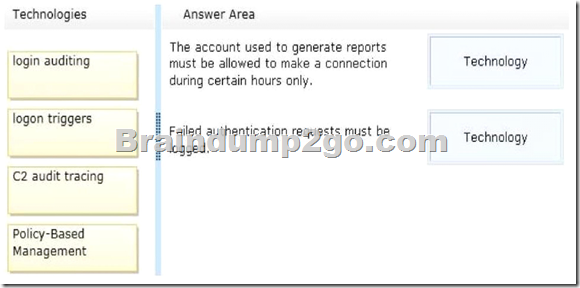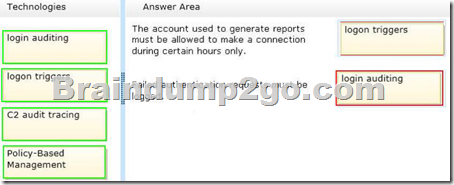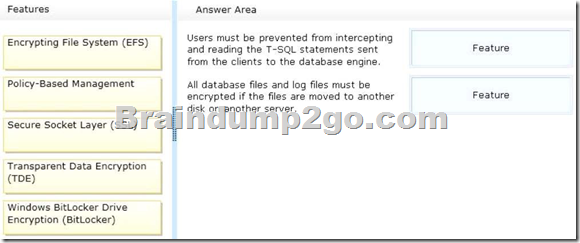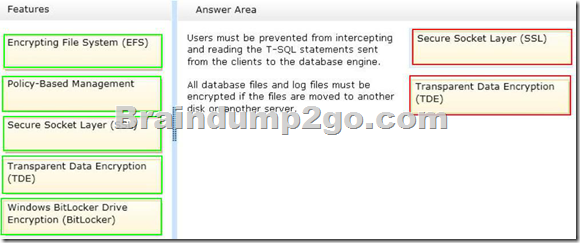6 03 2015
70-465 New Released Exam Questions from Braindump2go 100% Same With Real Microsoft 70-465 Exam (21-30)
New Released Braindump2go Microsoft 70-465 Dumps PDF – Questions and Answers Updated with Microsoft Official Exam Center! Visit Braindump2go and download our 70-465 Exam Questions Now, Pass 70-465 100% at your first time!
Vendor: Microsoft
Exam Code: 70-465
Exam Name: Designing Database Solutions for Microsoft SQL Server 2014 Exam
QUESTION 21
Drag and Drop Question
You are designing an authentication strategy for a new server that has SQL Server 2014 installed.
The strategy must meet the following business requirements:
– The account used to generate reports must be allowed to make a connection during certain hours only.
– Failed authentication requests must be logged.
You need to recommend a technology that meets each business requirement.
The solution must minimize the amount of events that are logged.
Which technologies should you recommend? To answer, drag the appropriate solution to the correct business requirement in the answer area.
Answer:
Explanation:
– Logon triggers fire stored procedures in response to a LOGON event.
This event is raised when a user session is established with an instance of SQL Server.
Logon triggers fire after the authentication phase of logging in finishes, but before the user session is actually established.
You can use logon triggers to audit and control server sessions, such as by tracking login activity, restricting logins to SQL Server, or limiting the number of sessions for a specific login.
– Login auditing can be configured to write to the error log on the following events.
– Failed logins
– Successful logins
– Both failed and successful logins
Incorrect:
– C2 audit mode can be configured through SQL Server Management Studio or with the c2 audit mode option in sp_configure. Selecting this option will configure the server to record both failed and successful attempts to access statements and objects.
QUESTION 22
You are designing a SQL Server database for an order fulfillment system.
You create a table named Sales.Orders by using the following script:
Each order is tracked by using one of the following statuses:
– Fulfilled
– Shipped
– Ordered
– Received
You need to design the database to ensure that you can retrieve the status of an order on a given date.
The solution must ensure that new statuses can be added in the future.
What should you do? More than one answer choice may achieve the goal. Select the BEST answer.
A. To the Sales.Orders table, add a column named Status that will store the order status.
Update the Status column as the order status changes.
B. Create a new table named Sales.OrderStatus that contains three columns named OrderID,
StatusDate, and Status. Insert new rows into the table as the order status changes.
C. Implement change data capture on the Sales.Orders table.
D. To the Sales.Orders table, add three columns named FulfilledDate, ShippedDate, and
ReceivedDate. Update the value of each column from null to the appropriate date as the
order status changes.
Answer: A
QUESTION 23
You have two SQL Server 2012 instances named SQLDev and SQLProd.
You plan to create a new database on SQLProd that will use SQL Server Authentication.
You need to ensure that when the new database is copied from SQLProd to SQLDev, users can connect to the database on SQLDev if they do not have a login on the SQLDev instance.
What should you use? More than one answer choice may achieve the goal. Select the BEST answer.
A. SQL Server Integration Services (SSIS) scripts
B. Extended Events
C. Triggers
D. SQL Server Analysis Services (SSAS) scripts
E. Contained database
Answer: E
QUESTION 24
Your company has offices in Seattle and Montreal.
The network contains two servers named Server1 and Server2 that have SQL Server 2012 installed.
The servers are located in separate building within your campus.
The latency of the WAN link between the buildings is less than 10 ms.
You plan to implement an AlwaysOn availability group on both servers.
You need to recommend a failover type for the availability group.
What should you recommend?
A. Asynchronous automatic failover
B. Synchronous manual failover
C. Asynchronous manual failover
D. Synchronous automatic failover
Answer: D
QUESTION 25
Drag and Drop Question
You plan to deploy SQL Server 2014.
You identify the following security requirements for the deployment:
– Users must be prevented from intercepting and reading the T-SQL statements sent from the clients to the database engine.
– All database files and log files must be encrypted if the files are moved to another disk on another server.
You need to identify which feature meets each security requirement.
The solution must minimize processor overhead.
Which features should you identify? To answer, drag the appropriate feature to the correct requirement in the answer area.
Answer:
Explanation:
– Secure Sockets Layer (SSL) encryption enables transmitting encrypted data across the network between an instance of SQL Server and a client application.
– Transparent data encryption (TDE) performs real-time I/O encryption and decryption of the data and log files.
QUESTION 26
You have a database named DB1.
You plan to create a stored procedure that will insert rows into three different tables.
Each insert must use the same identifying value for each table, but the value must increase from one invocation of the stored procedure to the next.
Occasionally, the identifying value must be reset to its initial value.
You need to design a mechanism to hold the identifying values for the stored procedure to use.
What should you do? More than one answer choice may achieve the goal. Select the BEST answer.
A. Create a sequence object that holds the next value in the sequence.
Retrieve the next value by using the stored procedure.
Reset the value by using an ALTER SEQUENCE statement as needed.
B. Create a sequence object that holds the next value in the sequence.
Retrieve the next value by using the stored procedure.
Increment the sequence object to the next value by using an ALTER SEQUENCE statement.
Reset the value as needed by using a different ALTER SEQUENCE statement.
C. Create a fourth table that holds the next value in the sequence.
At the end each transaction, update the value by using the stored procedure.
Reset the value as needed by using an UPDATE statement.
D. Create an identity column in each of the three tables.
Use the same seed and the same increment for each table.
Insert new rows into the tables by using the stored procedure.
Use the DBCC CHECKIDENT command to reset the columns as needed.
Answer: A
Explanation:
– an application can obtain the next sequence number without inserting the row by calling the NEXT VALUE FOR function.
– ALTER SEQUENCE
Includes argument:
RESTART [ WITH <constant> ]
The next value that will be returned by the sequence object. If provided, the RESTART WITH value must be an integer that is less than or equal to the maximum and greater than or equal to the minimum value of the sequence object. If the WITH value is omitted, the sequence numbering restarts based on the original CREATE SEQUENCE options.
– CREATE SEQUENCE
Creates a sequence object and specifies its properties. A sequence is a user-defined schema bound object that generates a sequence of numeric values according to the specification with which the sequence was created. The sequence of numeric values is generated in an ascending or descending order at a defined interval and can be configured to restart (cycle) when exhausted.
QUESTION 27
You plan to create a database.
The database will be used by a Microsoft .NET application for a special event that will last for two days. During the event, data must be highly available.
After the event, the database will be deleted.
You need to recommend a solution to implement the database while minimizing costs.
The solution must not affect any existing applications.
What should you recommend? More than one answer choice may achieve the goal. Select the BEST answer.
A. Max Degree of Parallelism
B. Resource Governor
C. Windows System Resource Manager (WSRM)
D. Processor affinity
Answer: D
QUESTION 28
You are building a stored procedure for a SQL Azure database.
The procedure will add multiple rows to a table.
You need to design the stored procedure to meet the following requirements:
– If any of the new rows violates a table constraint, then no further additions must be attempted and all changes made by the stored procedure must be discarded.
– If any errors occur, a row must be added to an audit table, and the original error must be returned to the caller of the stored procedure.
What should you include in the design?
A. An implicit transaction that has XACT_ABORT enabled
B. An explicit transaction that has XACT_ABORT disabled
C. An implicit transaction that has error handling enabled
D. An explicit transaction that has error handling enabled
Answer: D
QUESTION 29
You have a SQL Server 2012 database named DB1.
You plan to import a large number of records from a SQL Azure database to DB1.
You need to recommend a solution to minimize the amount of space used in the transaction log during the import operation.
What should you include in the recommendation?
A. a new log file
B. a new filegroup
C. the full recovery model
D. a new partitioned table
E. the bulk-logged recovery model
Answer: E
Explanation:
Compared to the full recovery model, which fully logs all transactions, the bulk-logged recovery model minimally logs bulk operations, although fully logging other transactions.
The bulk-logged recovery model protects against media failure and, for bulk operations, provides the best performance and least log space usage.
Note:
The bulk-logged recovery model is a special-purpose recovery model that should be used only intermittently to improve the performance of certain large-scale bulk operations, such as bulk imports of large amounts of data.
Recovery Models (SQL Server)
QUESTION 30
You have two SQL Server instances named SQLDev and SQLProd that have access to various storage media.
You plan to synchronize SQLDev and SQLProd.
You need to recommend a solution that meets the following requirements:
– The database schemas must be synchronized from SQLDev to SQLProd.
– The database on SQLDev must be deployed to SQLProd by using a package.
– The package must support being deployed to SQL Azure.
What should you recommend? More than one answer choice may achieve the goal. Select the BEST answer.
A. A database snapshot
B. A data-tier application
C. Change data capture
D. SQL Server Integration Services (SSIS)
Answer: B
Explanation:
http://technet.microsoft.com/en-us/library/ee210546.aspx
Braindump2go New Released 70-465 Dumps PDF are Now For Free Download, 149 Latest Questions, Download It Right Now and Pass Your Exam 100%:
http://www.braindump2go.com/70-465.html
[NEW UPDATION] Braindump2go Free Exam Microsoft 70-465 Practice Exam Questions (11-20) Microsoft New Released Exam: 70-465 Dumps Free Download From Braindump2go! (31-40)
![1[9] 1[9]](http://examgod.com/bdimages/f592f6000308_DB48/19.png)





![1[5] 1[5]](http://examgod.com/bdimages/f592f6000308_DB48/15.png)
Comments are currently closed.